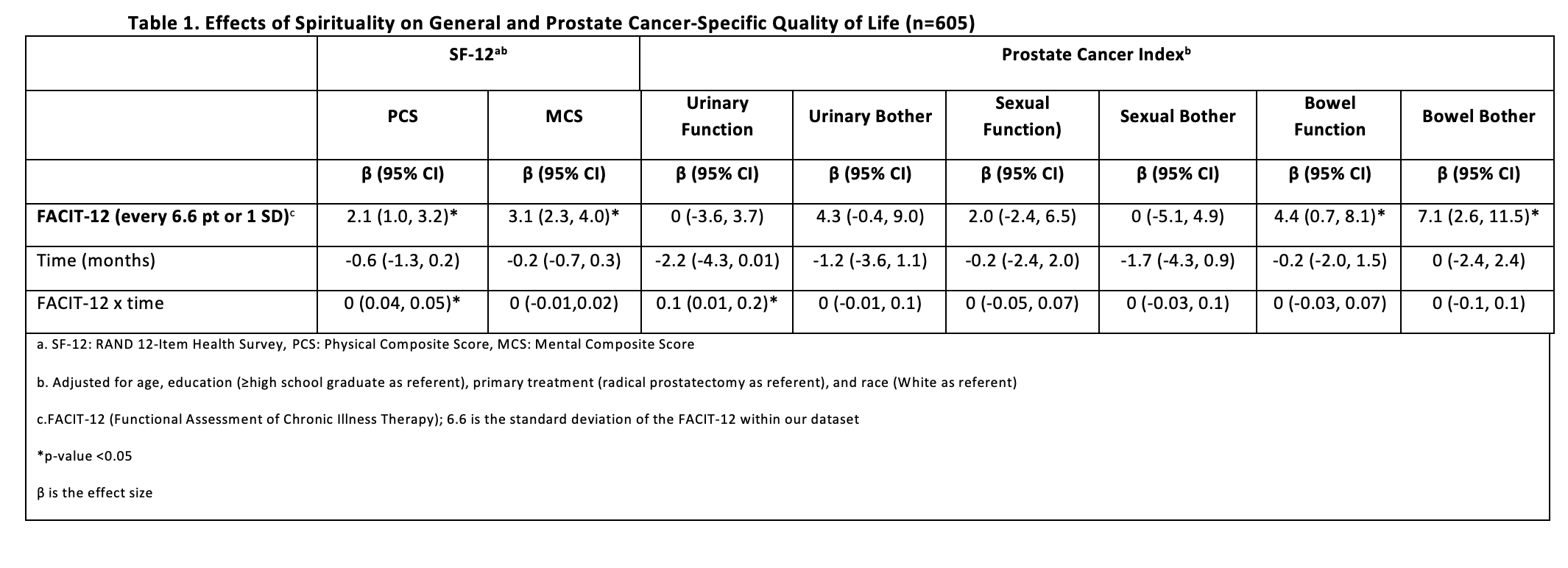Back
Poster, Podium & Video Sessions
Moderated Poster
MP28: Health Services Research: Practice Patterns, Quality of Life and Shared Decision Making III
MP28-09: Impact of Spirituality on Quality of Life in Low-Income Men with Prostate Cancer
Saturday, May 14, 2022
1:00 PM – 2:15 PM
Location: Room 228
Thomas Gaither*, Mark Litwin, Los Angeles, CA
- TG
Poster Presenter(s)
Introduction: Spirituality is a multi-dimensional construct and often interdependent with many biological, psychosocial, and interpersonal aspects of life. We present the effects of spirituality on general and cancer-specific quality of life in a contemporaneous cohort of low-income, uninsured, minority men with prostate cancer.
Methods: We analyzed data from men receiving care in the Improving Access Counseling and Treatment for Californians with Prostate Cancer (IMPACT) program and enrolled in a companion prospective cohort study. The IMPACT program provides disease specific healthcare covered for men with prostate cancer at or below 200% of the federal poverty level. Spirituality was measured using the Functional Assessment of Chronic Illness Therapy (FACIT-12), a 12-item questionnaire assessing spiritual well-being in patients with cancer or other chronic illness. Quality of life measures included the RAND SF-12 and the UCLA Prostate Cancer Index (PCI) at baseline and every 6 months. We used generalized estimating equations to assess the independent effects of spirituality on quality of life.
Results: Our analysis included 605 men. Mean cohort age was 61.5 years (SD 6.3); 86% had a high school education or less. Forty-eight percent underwent prostatectomy, and 40% had primary radiation therapy. Mean FACIT-12 score was 33.9; the variation was mostly between (SD 6.6) rather than within (SD 2.5) individuals. Table 1 shows our multivariable analysis. After controlling for age, education, primary treatment received, race, and time, spirituality was positively associated with both physical and mental summary scores (ß= +2.1 and +3.1, respectively, p<0.05). Spirituality was positively associated with bowel function and bother scores (ß= +4.4 and +7.1, respectively, p<0.05) but not statistically associated with urinary or sexual function or bother. The mean follow-up time within the study was 9.3 months (range 0-57).
Conclusions: This large, contemporary cohort confirms a prior report that low-income men with prostate cancer experience a wide variation of spiritual wellness. Spirituality is highly correlated with general quality of life measures and moderately associated with disease-specific quality of life. Hence, interventions assessing and targeting spirituality may improve overall quality of life in men with prostate cancer.
Source of Funding: Departmental

Methods: We analyzed data from men receiving care in the Improving Access Counseling and Treatment for Californians with Prostate Cancer (IMPACT) program and enrolled in a companion prospective cohort study. The IMPACT program provides disease specific healthcare covered for men with prostate cancer at or below 200% of the federal poverty level. Spirituality was measured using the Functional Assessment of Chronic Illness Therapy (FACIT-12), a 12-item questionnaire assessing spiritual well-being in patients with cancer or other chronic illness. Quality of life measures included the RAND SF-12 and the UCLA Prostate Cancer Index (PCI) at baseline and every 6 months. We used generalized estimating equations to assess the independent effects of spirituality on quality of life.
Results: Our analysis included 605 men. Mean cohort age was 61.5 years (SD 6.3); 86% had a high school education or less. Forty-eight percent underwent prostatectomy, and 40% had primary radiation therapy. Mean FACIT-12 score was 33.9; the variation was mostly between (SD 6.6) rather than within (SD 2.5) individuals. Table 1 shows our multivariable analysis. After controlling for age, education, primary treatment received, race, and time, spirituality was positively associated with both physical and mental summary scores (ß= +2.1 and +3.1, respectively, p<0.05). Spirituality was positively associated with bowel function and bother scores (ß= +4.4 and +7.1, respectively, p<0.05) but not statistically associated with urinary or sexual function or bother. The mean follow-up time within the study was 9.3 months (range 0-57).
Conclusions: This large, contemporary cohort confirms a prior report that low-income men with prostate cancer experience a wide variation of spiritual wellness. Spirituality is highly correlated with general quality of life measures and moderately associated with disease-specific quality of life. Hence, interventions assessing and targeting spirituality may improve overall quality of life in men with prostate cancer.
Source of Funding: Departmental


.jpg)
.jpg)